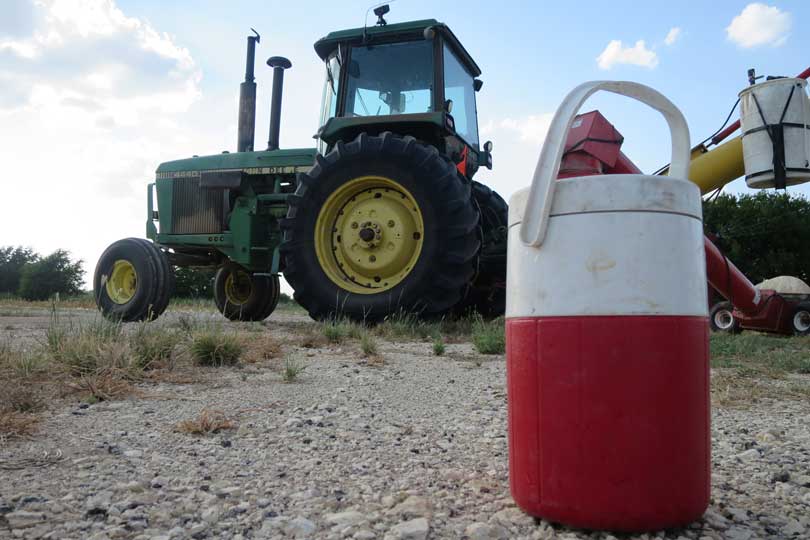By Jennifer Dorsett
Field Editor
Summer is a time of hard work and high temperatures. This combination could be dangerous for farmers and ranchers, as heat illness can develop quickly.
Dr. James Sharp, a family physician from Waco, said summertime presents different challenges for those who spend large amounts of time outdoors.
“The two big things are dehydration, which can get serious pretty quickly, and the other is long-term sun damage or the risk of skin cancer,” Sharp said.
Heat illness begins with dehydration and can quickly progress to more serious forms if left unchecked.
According to Sharp, water is the best thirst quencher, followed by sports drinks such as Gatorade. An ice-cold soda may taste refreshing, but the large quantities of sugar and caffeine work against the body’s hydration process.
Sustained dehydration and exposure to high temperatures can lead to heat exhaustion, which occurs when the body becomes too hot.
Signs of heat exhaustion include excessive thirst, dizziness, headaches, nausea and vomiting, diarrhea and muscle cramps.
“It’s unfortunate, because some of these symptoms may mimic a stomach bug,” Sharp said. “If you’ve been working outside all day and have nausea and diarrhea, don’t think ‘I just ate something bad,’ instead think ‘I may be suffering from heat exhaustion.’”
If someone has symptoms of heat exhaustion, they need to be taken out of the heat immediately.
Provide that individual with cool water and apply other cooling measures, such as towels dipped in cold water to the skin. If these measures fail to help within 15 minutes, call for emergency medical assistance as the next stage of heat illness can be fatal, Sharp said.
Heat stroke is the final stage of heat illness and is an extremely serious condition that requires immediate medical attention.
In addition to the same symptoms as heat exhaustion, heat stroke victims often experience confusion, weakness, unusual fatigue and difficulty concentrating. Clinical symptoms of heat stroke include fever, excessive sweating, rapid heart rate, quick and shallow breathing, low blood pressure and even seizures or unconsciousness.
Sharp said someone who is suffering a heat stroke will have obvious difficulty continuing any activity and is often clumsy and weak.
“Sweating heavily is not a good thing,” Sharp said. “That means they’ve lost control of body temperature regulation. Once a person has a 101 or 102 degree fever, they’re already in trouble. It is absolutely vital to get that person to medical care as quickly as possible.”
If someone has been outdoors for very long and displays these symptoms, call 911.
“It’s a little hard to tell the difference when things cross the threshold from exhaustion to a more serious situation,” Sharp said. “So, if a person seems to be confused or is really unusually weak, they need to get to an emergency room as soon as they can.”
Sharp also stressed the importance of sun protection to prevent skin damage.
He recommends buying sunscreen with minimum rating of 45 to 50 SPF and reapplying every two to three hours.
Wearing appropriate sun protection is the most effective way to prevent sun damage. Sharp recommends wide-brimmed hats, long-sleeved shirts, sunglasses and sunscreen.
“These are all excellent ways to keep the direct sun off skin,” Sharp said. “Especially that wide-brimmed hat—not a ball cap.”
Take in enough fluids and watch body temperature during these long, hot days and be alert for heat-related illnesses, Sharp said.

